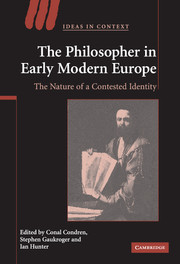Book contents
- Frontmatter
- Contents
- List of contributors
- Acknowledgements
- Introduction
- 1 The persona of the natural philosopher
- 2 The university philosopher in early modern Germany
- 3 The persona of the philosopher and the rhetorics of office in early modern England
- 4 From Sir Thomas More to Robert Burton: the laughing philosopher in the early modern period
- 5 Hobbes, the universities and the history of philosophy
- 6 The judicial persona in historical context: the case of Matthew Hale
- 7 Persona and office: Althusius on the formation of magistrates and councillors
- 8 Descartes as sage: spiritual askesis in Cartesian philosophy
- 9 The natural philosopher and the virtues
- 10 Fictions of a feminine philosophical persona: Christine de Pizan, Margaret Cavendish and philosophia lost
- 11 John Locke and polite philosophy
- Index
- IDEAS IN CONTEXT
6 - The judicial persona in historical context: the case of Matthew Hale
Published online by Cambridge University Press: 06 November 2009
- Frontmatter
- Contents
- List of contributors
- Acknowledgements
- Introduction
- 1 The persona of the natural philosopher
- 2 The university philosopher in early modern Germany
- 3 The persona of the philosopher and the rhetorics of office in early modern England
- 4 From Sir Thomas More to Robert Burton: the laughing philosopher in the early modern period
- 5 Hobbes, the universities and the history of philosophy
- 6 The judicial persona in historical context: the case of Matthew Hale
- 7 Persona and office: Althusius on the formation of magistrates and councillors
- 8 Descartes as sage: spiritual askesis in Cartesian philosophy
- 9 The natural philosopher and the virtues
- 10 Fictions of a feminine philosophical persona: Christine de Pizan, Margaret Cavendish and philosophia lost
- 11 John Locke and polite philosophy
- Index
- IDEAS IN CONTEXT
Summary
The persona of the jurist has a rich normative history, particularly in stories of God as the judge or the judge as God. Lowering our sights to the human forum, however, brings into view an attribute of the judicial persona – impartiality in adjudication – that is less a divine gift than an ethical capacity, laboriously acquired and unevenly distributed. To describe the history of the judicial persona, however, we need to consider a further dimension: the neutrality of the entire legal system within which that persona works. For its exercise, the office of judge presumes a jurisdiction, that is, a delimited ambit of adjudication that is inseparable from a definite historical scene and political setting.
In an early modern scene scarred by confessional conflict, territorial state-building relied on two essential juridical activities: legislation and adjudication. Temporal jurisdictions emerged as boundaries were drawn between state and church, between civil laws and the powers of the papacy. Legal officers – jurists and judges – were at the epicentre of profound disputes over where to draw the boundaries, as territorial states sought to separate their administration from trans-territorial powers of church and empire. It was a question of fixing the locus and character of a power of final determination. Given territorial variations in religious, political and legal conditions, there was no one model or right answer. Any consideration of the judicial persona within its early modern setting therefore dictates an approach that is relativising, comparative and jurisdictionally specific.
- Type
- Chapter
- Information
- The Philosopher in Early Modern EuropeThe Nature of a Contested Identity, pp. 140 - 159Publisher: Cambridge University PressPrint publication year: 2006
- 2
- Cited by

